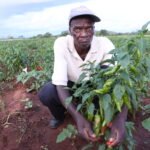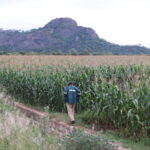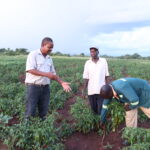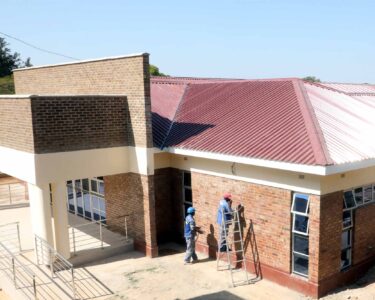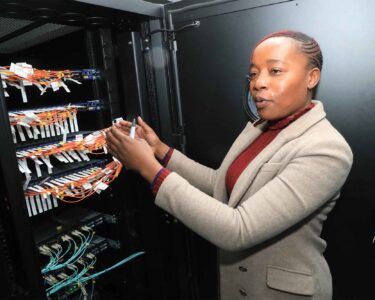A quiet revolution is taking place in Zimbabwe’s agricultural landscape, thanks to the government’s Irrigation Development Alliance, which seeks to put 350 000 hectares under irrigation by 2025. Zimbabwe’s once marginalised rural areas are fast becoming green and, indeed, no one and no place is being left behind.
With four vibrant irrigation schemes under its orbit, Mberengwa South constituency is easily one of the biggest beneficiaries of the Irrigation Development Alliance. Our reporter, Elias Chakanyuka, visited one of the schemes, Biri Extension Irrigation Scheme, and came away with the inescapable conclusion that irrigation is, indeed, the way to go to achieve food self-sufficiency at communal level. Read on . . .
In March, the Brick by Brick magazine team was on extensive tour of mining and agricultural projects in the Midlands Province. One of our stops was Mimosa Mine, after which we had an appointment with members of the Biri Extension Irrigation Scheme in Mberengwa South. According to our rudimentary research, Biri was just an hour’s drive away. Wrong.
Just as the team was starting out, the skies opened up releasing torrents of rain that threatened to scuttle our appointment. But we soldiered on. After about an hour’s drive, the team stopped to ask for directions at a growth point. The response from one young man who offered us some guidance was telling: “Ahhh, you want to go to Biri Extension Irrigation Scheme at this time of day? Moto rova mota zvakasimba because you still have some distance to cover.”
The Brick by Brick team soon discovered that the young man’s words were no understatement. To make matters worse, the team used an old dust road that had been rendered unnavigable by the rains. It was like the team was driving to the end of the world.
We passed through countless rivers, mountains and village after village before we finally got to our destination, some three hours later. On hand to welcome us was Jonathan Gambiza, the scheme’s agriculture extension supervisor; and Nyashadzashe Mudzungairi, the resident technician responsible for irrigation projects in Mberengwa District.
The introductory formalities over, it was time for Tinomuvonga Hove, the Biri Extension Irrigation Scheme chairperson, to give the Brick by Brick team the heads up.
“This project started in 2005 and there are 280 farmers drawn from Headmen Taruvinga, Nangati, Soshera, Mandevere, Fana and Dzingai. Because the menfolk are gainfully employed elsewhere, the majority of the farmers are women,” Hove told Brick by Brick.
Youths, too, were part of the scheme, but Hove expressed disappointment that some of them lacked commitment. “Although, we have youths in this scheme they don’t attend regularly to their crops. We have to literally push them to come and work on their plots. The biggest problem is that most of the youths here are former gold panners. They were used to easy rich pickings. Some of them are not even keen on farming since it requires lots of hard work – and patience. We see some of the youths loitering at the local business centre. It’s very sad, but I am happy that we are slowly winning over some of them. Quite a good number are showing interest in joining the scheme,” said Hove.
“One hundred and thirty hectares are fenced while 117 hectares are suitable for cultivation. Currently, we have 70 hectares under maize and 25 hectares under paprika. We use a cropping calendar and for planting we use the block system. Until now, our main challenge was lack of water. However, government chipped in with irrigation equipment.”
Despite the nagging challenges, Hove was upbeat when asked about Biri Extension Irrigation Scheme’s impact. Said the chairperson: “This project has changed the lives of the community. For example, the majority of families lived in pole-and-dagga houses, but now they have built themselves mortar-and-brick houses. Some have even built houses at the nearby business centre which they are renting out. Others have beefed up their cattle herds in addition to buying the much-prized scotchcarts.”
Hove also applauded the government for providing them with inputs under the Presidential Inputs Scheme and other interventions. “We can’t thank the government enough. Recently, our transformer and some cables were stolen. Our Member of Parliament, Tasara Hungwe, left no stone unturned in making sure that we got a replacement transformer. We have since hired security guards to patrol the electricity infrastructure during the night to foil thieves.
“Again, we would like to thank government for the assistance they are giving us. Without government, we would be seated at home, doing nothing,” said Hove.
Mudzungairi, the resident technician, was standing nearby itching to put a word in.
Says Mudzungairi: “Mberengwa receives erratic to low rainfall, posing a serious threat to food security for our people. Due to climate change, irrigation is the only way to go. We can no longer rely on the rains. Irrigation farming gives the farmer assurance that water is available throughout the year.
“The government of Zimbabwe is doing everything in its power to ensure that farmers are self-reliant and food-secure. The Second Republic has changed the people’s mentality from the past when agriculture was regarded as something of a hobby. Now farmers know that farming is a business that can change their lives.”
“I am pleased that government has come up with initiatives [such as Biri Extension Irrigation Scheme] to make sure that the people in Mberengwa are food secure. The government has gone into partnership with a number of private players to ensure that the irrigation schemes in this area are successful.
“Biri Extension is a model irrigation scheme. Production and productivity are very high because the farmers receive regular training while any breakdowns in the irrigation equipment are attended to as a matter of urgency. Most importantly, Government provides the farmers with all its inputs needs. The scheme is being run like a business, and it is something I would like to see replicated countrywide.”
As project supervisor, Gambiza had the last word.
“I am in charge of four irrigation schemes in Mberengwa South constituency — Biri, Biri Extension, Zvavachari and Urasha. I am the overall supervisor of all the agricultural extension officers overseeing these irrigation schemes.
“These four irrigation schemes are very successful because we work closely with the communities. Our goal is to improve food security through high productivity. These schemes are vital in terms of food and nutrition security. There is no doubt that, through these schemes, we are on course to achieving food security at household level which will subsequently translate to the national level. These schemes are contributing significantly towards the country’s Gross Domestic Product (GDP).
“Irrigation farming, particularly in this Natural Region IV, is the way to go. We usually get erratic or low rainfall, but since we started these irrigation schemes, the standard of living of our people has improved drastically.
“What is gratifying is that our people are very enthusiastic to work in these irrigation schemes. They work with minimal supervision because they know this is where their livelihood lies. However, they require frequent training to keep them abreast with modern farming methods, particularly in this era of climate change. It is worth noting, too, that there are also new plant diseases and pests whose existence calls for a continuous farmer education. We are happy that the farmers are really eager to learn because they are now aware of the benefits of irrigation.
“As Agritex we offer the farmers advisory services in crop and animal husbandry and the cultivation of high-value horticultural crops so that our farmers get quick returns on their investment. To achieve this, we have a marketing committee responsible for identifying potentially lucrative markets. Members of the committee go out there to secure markets before the crop is even in the ground. The bulk of the produce goes to local boarding schools like Musume High School, Munene High School and Chegato High School. However, some of the produce finds its way to Zvishavane, which is the nearest town,” explained Gambiza.
However, while water supplies are guaranteed, electricity is not.
“We are doing very well, but we have challenges in terms of electricity. We urgently need generators or solar power because loadshedding is affecting our irrigation schedules.
“However, we are grateful to the government for educating the farmers on the benefits of irrigation farming, which is the way to go. Irrigation farming has given Mberengwa South a new lease of life. A number of families now have piped water from Mutangwi Dam to their homesteads. Some have bought cattle, others cars.
“The agriculture revolution sparked by irrigation has also had an impact on the youths, who have received training in livestock management, poultry and goat production as well as cattle pen fattening. Others have undergone skills training as electricians, builders, etc. These training programmes have gone a long way in reducing the unemployment rate in Mberengwa South. Our youths are now empowered to start their own income-generating projects. Instead of looking for jobs, they are actually creating employment.”
Gambiza’s parting words were: “As Agritex, we thank the government for capacitating our officers through a raft of training programmes. We are more than confident that we will achieve Vision 2030.”



